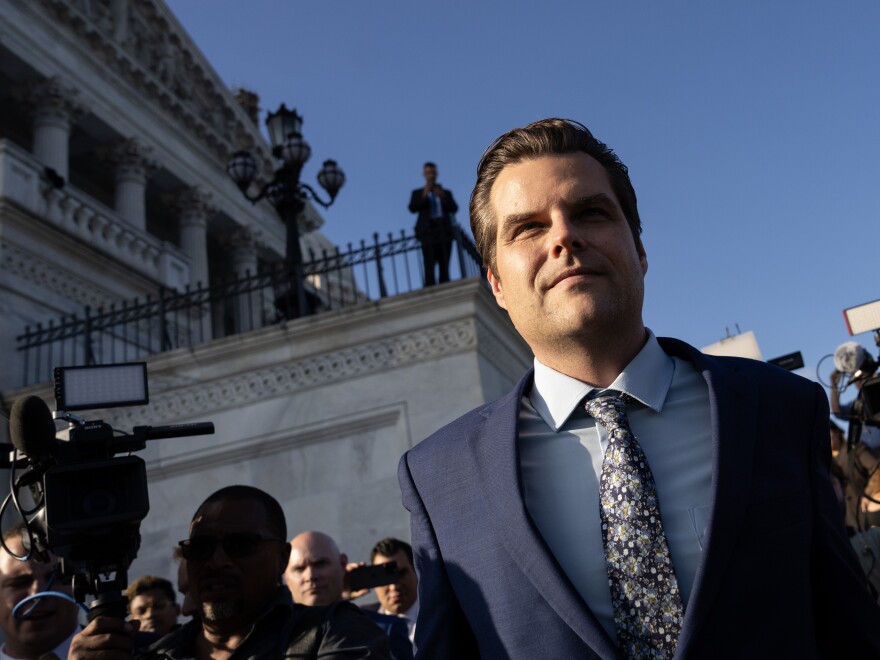Updated October 3, 2023 at 7:50 PM ET
The House has voted to remove Kevin McCarthy as speaker, marking the first time in history that a House speaker has been removed in this way.
The final vote was 216-210 in favor of a motion to "vacate the chair." Eight Republicans, led by Florida Rep. Matt Gaetz, joined all Democrats present in voting against McCarthy.
McCarthy told reporters in the Capitol that he will not run again for speaker.
"I leave the speakership with a sense of pride, accomplishment and yes, optimism," he said. "I will not run for speaker again. I will have the conference pick someone else."
McCarthy said he does not regret the disagreements with members of his own party that led to his demise.
"I do not regret negotiating," McCarthy said. "Our government is designed to find compromise."
Congress has now entered uncharted territory: The House will be forced to hold votes on a new speaker, though McCarthy's defectors have not named any alternative nominee. It's not clear that any other Republican could win enough votes to secure the gavel.
The vote marks the end of a fraught speakership for McCarthy. It took him 15 rounds of voting to secure the position in January. And in recent weeks, hardliners within his party blocked his efforts to pass a temporary spending bill to avoid a government shutdown.
Rep. Patrick McHenry, the chair of the Financial Services Committee, has been named speaker pro tempore, or interim speaker, until a new leader is elected.

Republicans plan for a new speaker
Majority Whip Tom Emmer indicated he would not run for speaker, when asked if he would consider it Tuesday evening. "[House Majority Leader] Steve Scalise has been a good friend for a long time and he would be a great speaker," he said.
Scalise, R-La., has been undergoing treatment for multiple myeloma, a form of blood cancer. He recently said his treatments so far have been successful. Scalise told reporters in the Capitol that he does not have any announcement to make at this time.
Members told reporters that they expect to hold a candidate forum next Tuesday ahead of votes on a speaker, possibly as early as Wednesday.
Republicans split into factions
Gaetz, who never supported McCarthy's candidacy in January, has cited McCarthy's decision to pass a short-term spending bill with Democratic support as evidence he has not "fulfilled his promises" to conservatives.

After the vote Tuesday, Gaetz told reporters that this move "represents the ripping off of the band aid, and that's what we need to do to get back on track."
McCarthy was defiant but resigned to the vote following a lengthy meeting of House Republicans earlier in the day.
"If you throw a speaker out that has 99 percent of their conference, that kept government open and paid the troops, I think we're in a really bad place," McCarthy told reporters in the Capitol Tuesday morning.
Democrats refuse to save McCarthy
Ahead of the vote, there was speculation that Democrats might step in to save McCarthy's speakership by voting "present" rather than in favor of the motion to vacate. But McCarthy said he was not willing to offer any concessions to Democrats to help him stay in power.
House Minority Leader Hakeem Jeffries, D-N.Y., said it would be up to Republicans to "break with extremists."
House Democrats will continue to put people over politics.
— Hakeem Jeffries (@RepJeffries) October 3, 2023
We are ready to find bipartisan common ground.
Our extreme colleagues have shown no willingness to do the same.
They must find a way to end the House Republican Civil War.
"We are ready, willing and able to work together with our Republican colleagues but it is on them to join us to move the Congress and the country forward," Jeffries told reporters in the Capitol.

His comments followed a lengthy "open mic" meeting of House Democrats in the basement of the Capitol complex Tuesday. One by one lawmakers got up and had one minute to advise on what they thought the caucus should do, and one by one Democrats railed on Speaker McCarthy's record and his unwillingness to reach across the aisle.
"I think Kevin McCarthy is among the most unprincipled, untrustworthy people I ever have encountered in the entirety of my life, and I think he does damage to this institution and our democracy," Virginia Rep. Abigail Spanberger, a moderate Democrat, told reporters.
Multiple Democrats told NPR that neither the speaker nor his allies had approached Democratic leaders with any proposal to support him.
Rep. Richard Neal, D-Mass., said McCarthy's decision to change the rules on who can propose a resolution to remove the speaker, allowing just one member to do it — a concession made for McCarthy to get the speakership in the first place — "essentially puts the fringe in charge of the House of Representatives in terms of rulemaking."
Neal said he had a "Machiavellian position" about that decision in January: "Once you seal the deal, you have to take the consequences."
After the vote, White House press secretary Karine Jean-Pierre said President Biden was eager to work with both parties in Congress, and said he hoped the House would elect a speaker soon. "Because the urgent challenges facing our nation will not wait, he hopes the House will quickly elect a speaker," she said in a statement.
Copyright 2023 NPR. To see more, visit https://www.npr.org.





